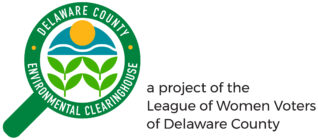Organization of the Month:
Marcus Hook Area Neighbors for Public Health
Marcus Hook Area Neighbors for Public Health started out as a small group of residents meeting in a diner in 2020 who were alarmed by the lack of concern for air pollution in Marcus Hook, home to a large concentration of petrochemical industries.

The small group of founding members realized that Marcus Hook has been politically and economically entangled with polluting heavy industry for more than 120 years, ever since Sun Oil Co. established a refinery there in 1901. Before that, it was a large shipbuilding and provisioning center for much of the 19th century.
“There were no environmental groups working in the Marcus Hook area at all. Because of the cultural history of Marcus Hook, everyone thought it was a lost cause. Many people feel that way and many don’t,” said Echo Alford, a leader of MHANPH.
Today, the term “area” in the group’s name includes not only Marcus Hook but also Boothwyn, Chester Township, City of Chester, Linwood, Ogden, Parkside, Trainer, Twin Oaks, Upland, and Upper Chichester, all “fence line” communities that border on or host polluting industrial facilities in the county’s southeast corner.
According to Alford, MHANPH partnered with the Clean Air Council to participate as subjects and stakeholders in the ASSESS study conducted by Johns Hopkins University. Alford was later hired as Delaware County advocacy coordinator for the Clean Air Council, an example of an established environmental organization reaching out to the affected community.
The ASSESS research results were presented to the community in July (see the Delco Environmental Clearinghouse article here}.
That study showed that residents of the Chester and Marcus Hook areas are subject to excessive and constant foul odors, air pollution and noise as well as non-environmental stressors, such as economic and housing insecurity and crime.
Equally important, the study showed that the “cumulative burden” of all sources of pollution on human health is weighing most heavily on residents of the 12 communities even though each individual industry complies with federal air quality standards.
Now Marcus Hook Area Neighbors are focusing on using the results of the ASSESS study in several ways.
First, they have been tabling at events within the 11 communities all summer to educate people about the study, build visibility and invite their neighbors to join them.
MHANPH and the Clean Air Council have received funding from the U.S. Environmental Protection Agency to install outdoor air monitors at homes, businesses and organizations throughout the fence line communities.
They are currently waiting for the EPA to approve the installation of the monitors, a project that should tell them a lot more about air quality in the affected communities. For more information on that project contact airmonitoring@cleanair.org.
MHANPH is urging the Pennsylvania Department of Environmental Protection for rulemaking to enable environmental justice communities across the state to have more say on the approval and permitting process on projects and facilities that negatively impact the health of their members. Both Chester and Marcus Hook are designated environmental justice communities that are already overburdened with air, water and noise pollution.
The organization is also focusing on environmental bills pending in the state Legislature, but with the current legislative session drawing to a close and the narrow partisan division in both the Senate and the House, they don’t expect much action on legislation for the rest of this year.
Echo said MHANPH has just formed another organization – the Naamans, Marcus Hook, Stony Creek Watershed Alliance – to restore water quality to those three creeks, reduce pollutants and improve water flow. The new alliance will also be working to restore riparian buffers along the creek beds to reduce erosion, filter out contaminants and create healthy wildlife corridors.
Marcus Hook Area Neighbors is and the newly formed alliance will be working on climate resilience – by building and maintaining green infrastructure and investing in open spaces. They are working with Trainer Borough to help create a plan for the Third Street Park that may ultimately include community gardens to provide fresh, locally grown food and rain gardens to help absorb runoff from storms, Alford said.
“We want to create park spaces to serve the needs of people in the face of climate change,” Alford said.
This small, local, largely unrecognized group has accomplished a lot in its four years, and it hopes to do much more. To join the group or find out about its activities, go to the MHANPH Facebook page and use the blue “Message” button to contact them.
